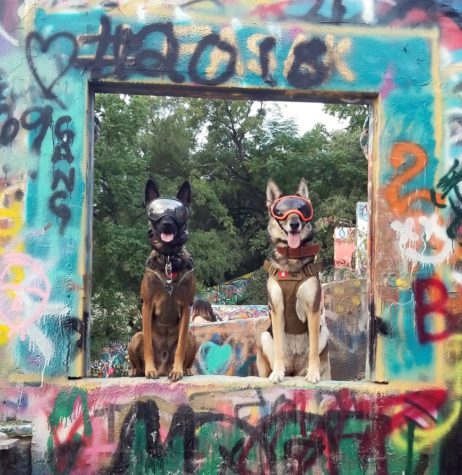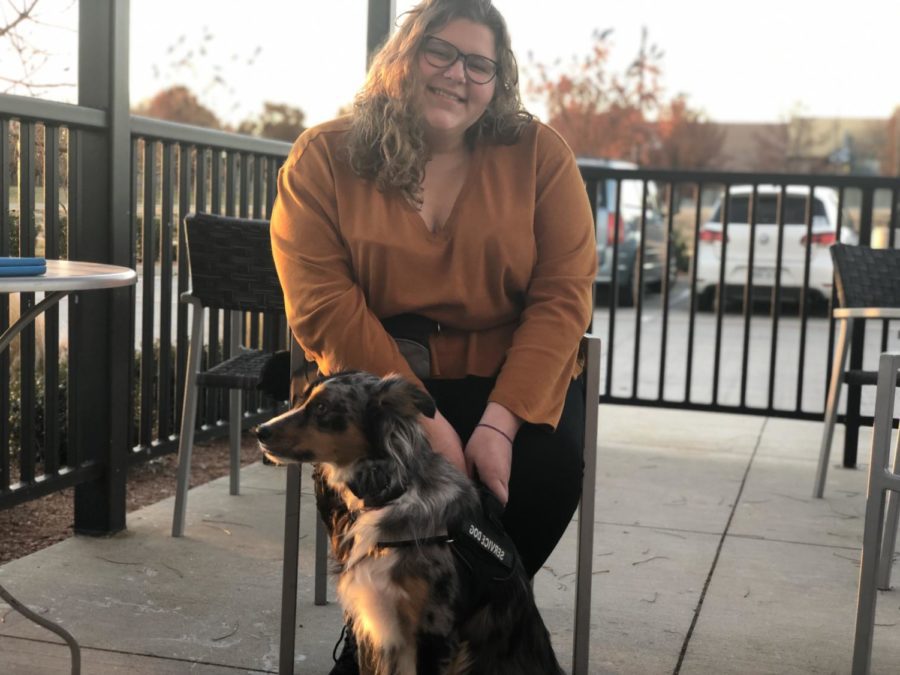Student relies on service dog in, out of school
Student Jennifer Sieira sits with her service dog, Hero. After a battle to bring him to campus, she is able to have him ready to assist her at all times. “You wouldn’t coax a wheelchair. You wouldn’t coax an oxygen tank, so don’t do it to a service dog,” Sieira said. “It’s medical equipment. It’s for me, not for you.”
Dogs can be a student’s best friend, and in the case of senior Jennifer Sieira, an important component of living a healthy life. Service animals can be powerful tools used to stabilize and maintain a person’s health.
While service animals serve as companions, handlers report, they aren’t for everyone. Sieira uses Hero, her mini Australian shepherd/black lab, to provide reminders to assist her in staying healthy. These trained animals require maintenance and near-constant attention, service dog handler Isabella Caruth said.
“Service dogs should never be the first option that anyone looks at,” said Carruth, who did not train Sieira’s dog. “Simply because it’s a lot of work sometimes. For people who have psychiatric disabilities, having a service dog can actually leave you a lot more hindered than it would enable you.”
Service dogs can bring unwanted attention, both negative and positive. Once someone has a service dog, they will never be alone again, as they are constant companions. In some cases, family members may not accept the new addition to the family.
“When I first started with my service dog, I was not invited fully to a wedding of my cousins,” Carruth said. “I was invited, but my service dog was not. She was not taken seriously by my family members despite the hundreds of hours of training she had gone through.”
In public, service animals and their owners are often targetted, whether by people who want to pet the animal, by people who dislike service animals and more.
“Unfortunately the general public still doesn’t respect service dogs or your privacy with them as much as they should,” Carruth said. “You get invasive questions, you have people who won’t let you into their store because they ‘don’t allow dogs in here,’ not understanding that service dogs are protected under federal law, as well as Texas state law.”
While there are difficulties to face while owning a service animal, however, the positives do outweigh the negatives.

“I love having someone who is there for me and can actually help me get through the day and I don’t mean by comfort, it’s so much more than that,” Carruth said. “It’s an animal that willingly chooses to be by your side and help you. Having something that wants to be with you and save your life every day is something that you can’t get from a human connection.”
Service animals can give their owners the ability to leave their homes or walk away from a horrible situation.
“Having that ability is what makes them worth it,” Carruth said through tears. “I would go through hundreds of days of being harassed by the public if it means I have Ziva or Meeko right next to me.”
A common issue service animal owners experience is people wanting to pet or distract their animals.
“You wouldn’t coax a wheelchair. You wouldn’t coax an oxygen tank, so don’t do it to a service dog,” Sieira said. “It’s medical equipment. It’s for me, not for you.”
Service animals often boast a harness asking the general public not to pet them. While it isn’t illegal to pet a service animal, it is a federal offense to harass or hurt a service dog.
“When a person baby talks my service dog, they are taking his attention off of me,” Carruth said. “If I start having a panic attack or he misses a low blood sugar alert, then that person is at fault. You distracting him puts my life in danger.”
Service animal owners train their dogs themselves, allowing more personalized functions as well as lowering the wait time for getting the dog.
“A lot of people want to go to an organization, but with those, there is usually a very long wait time, up to three to five years,” Sieira said. “Don’t be afraid to owner train a dog.”
For those who don’t want to take on training a service animal on their own, there are multiple organizations that offer training courses.
“There is a place in Frisco called ‘What a Great Dog,’ it’s very popular and has great one-on-one sessions,” Sieira said. “They are very caring and passionate about what they do.”
If you would like to get a service dog of your own, but you’re unsure of if you need one, ask your doctor what they recommend.
“If you find that you have a disability that affects you in your daily life, then you may look into getting a service dog,” Sieira said. “Talk to your doctor about it and other treatment options before you go to a service dog.”
Students who own service animals may bring them onto campus if they follow specific criteria.
“Our board policy allows for a service dog or a miniature horse,” assistant principal John Boehringer said. “The animal has to perform a function and that function has to be an identifiable task.”
The school has a committee that a student must go through before bringing their animal on campus.
“That committee makes decisions about what accommodations will be allowed for the person with disabilities within the school,” Boehringer said. “Allowing for a service animal is one of those things.”
As long as the animal can perform a useful task, it will likely be allowed on campus. One other factor is the behavior of the animal.
“The animal must be under the control of the handler at all times,” Boehringer said. “Assuming it’s a dog, it can’t jump on other students. It’s not even supposed to interact with other students.”

Once the service animal is permitted on campus, it can continue helping its owner live a full life.
“It’s not just having the dog with you, it’s so much more than that,” Carruth said. “When I have my dog there and I look down I know there’s a grip. She’s gonna catch me.”
Your donation will support the student journalists of Prosper High School. Your contribution will allow us to purchase equipment and cover our annual website hosting costs.














service dog • Dec 20, 2021 at 1:22 am
I undoubtedly liked every part of it, and I also have you book-marked to look at new things on your website.